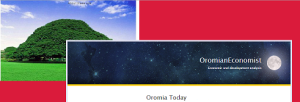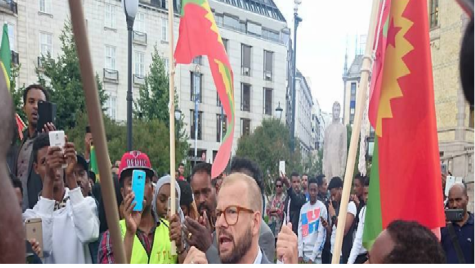Posted by OromianEconomist in Dictatorship, Ethiopia's Colonizing Structure and the Development Problems of People of Oromia, Afar, Ogaden, Sidama, Southern Ethiopia and the Omo Valley, Tyranny, Uncategorized.
Tags: #OromoProtests, Africa, Analysis, Ethiopia doesn’t want you to know these things are happening in the country, Famine, The study of Evil, TPLF, Tyrannic Ethiopia, Washington Post, Women and elders) are dying of genocidal mass killings and politically caused famine, World views


By Paul Schemm, Washington Post August 19, 2016

Ethiopians wait to fill water cans in February during the recent drought. With the return of the rains, however, have come flooding and disease — something the government is reluctant to discuss. (Aida Muluneh for The Washington Post)
ADDIS ABABA, ETHIOPIA — After going through its worst drought in 50 years, Ethiopia is again seeing rain. In fact, in some places, it’s falling too hard and has set off floods.
So while the number of people requiring food aid has dropped slightly from 10.2 million in January to 9.7 million, according to the latest figures, there is a new threat of disease in a population weakened by drought.
Measles, meningitis, malaria and scabies are on the rise. And most seriously, there has been an outbreak of something mysteriously called “AWD,” according to the Humanitarian Requirements Document, issued by the government and humanitarian agencies on Aug. 13.
“There is a high risk that AWD can spread to all regions with high speed as there is a frequent population movement between Addis Ababa and other regions,” it warned.
[1 in every 113 human beings is forcibly displaced from their home right now]
The letters stand for acute watery diarrhea. It is a potentially fatal condition caused by water infected with the vibrio cholera bacterium. Everywhere else in the world it is simply called cholera.
But not in Ethiopia, where international humanitarian organizations privately admit that they are only allowed to call it AWD and are not permitted to publish the number of people affected.
The government is apparently concerned about the international impact if news of a significant cholera outbreak were to get out, even though the disease is not unusual in East Africa.
This means that, hypothetically, when refugees from South Sudan with cholera flee across the border into Ethiopia, they suddenly have AWD instead.
[South Sudanese civilians fear the U.N. can’t protect them from a massacre]
In a similar manner, exactly one year ago, when aid organizations started sounding the alarm bells over the failed rains, government officials were divided over whether they would call it a drought and appeal for international aid.
Hundreds of protesters on Saturday clashed with police in Ethiopia’s capital Addis Ababa after campaigners called for nationwide protests due to what they say is an unfair distribution of wealth in the country. (Reuters)
The narrative for Ethiopia in 2015 was a successful nation with double-digit growth, and the government did not want to bring back memories of the 1980s drought that killed hundreds of thousands and left the country forever associated with famine.
“We don’t use the f-word,” explained an aid worker to me back in September, referring to famine.
Like many of its neighbors in the region, Ethiopia has some issues with freedom of expression and is very keen about how it is perceived abroad. While the country has many developmental successes to celebrate, its current sensitivity suggests it will be some time before this close U.S. ally resembles the democracy it has long claimed to be.
Ultimately, the government recognized there was a drought and made an international appeal for aid. The systems put into place over the years prevented the drought from turning into a humanitarian catastrophe — for which the country has earned praise from its international partners.
In the same manner, even though it doesn’t call it cholera, the government is still waging a vigorous campaign to educate people on how to avoid AWD, by boiling water and washing their hands.
Yet this sensitivity to bad news extends to the economic realm as well. Critics have often criticized Ethiopia’s decade of reported strong growth as being the product of cooked numbers. The government does seem to produce rosier figures than international institutions.
After the drought, the International Monetary Fund predicted in Aprilthat growth would drop from 10.2 percent in 2015 to just 4.5 percent in 2016.
Prime Minister Hailemariam Desalegn, maintained, however, that growth would be a robust 8.5 percent, despite the falling agriculture productivity and decreased export earnings.
In the political realm, news of unrest and protests is suppressed. During a weekend of demonstrations on Aug. 6 and 7, the Internet was cut, making it difficult to find out what happened.
Human rights organizations, opposition parties and media tried to piece together the toll from the deadly demonstrations, which according to Amnesty International may have been up to 100.
The United Nations has called for international observers to carry out an investigation in the affected regions, which the government has strongly rejected even as it has dismissed estimates of casualties without providing any of its own.
“That is one of the factors we are struggling against with this government, the blockade of information,” complained Beyene Petros, the chairman of a coalition of opposition parties. “Journalists cannot go and verify. We cannot do that.”
Local journalists are heavily constrained, and as Felix Horne of Human Rights Watch points out, Ethiopia is one of the biggest jailers of journalists on the continent.
“Limitations on independent media, jamming of television and radio signals, and recent blocking of social media all point to a government afraid to allow its citizens access to independent information,” he said.
Foreign journalists do not fare much better, especially if they attempt to venture out of the capital to do their reporting.
In March, the New York Times and Bloomberg correspondents were detained by police while trying to report on the disturbances in the Oromo Region.
They were sent back to Addis Ababa and held overnight in a local prison before being interrogated and released.
In a similar fashion, a television crew with American Public Broadcasting Service was detained on Aug. 8 south of the capital trying to do a story on the drought conditions.
They and their Ethiopian fixer — an accredited journalist in her own right — were released after 24 hours, and they were told not to do any reporting outside of Addis.
In both cases the journalists were all accredited by the Government Communication Affairs Office, with credentials that are supposed to extend the breadth of the country but in practice are widely ignored by local officials.
The government spokesman, Getachew Reda, has dismissed the allegations about the information crackdown in the country and in recent appearances on the Al Jazeera network he maintained that there are no obstacles to information in Ethiopia.
“This country is open for business, it’s open for the international community, people have every right to collect whatever information they want,” he said.
The tyrannic/fascist Ethiopia’s regime (TPLF) doesn’t want you to know these things are happening in the country, click here and read more at Washington Post
Posted by OromianEconomist in #OromoProtests.
Tags: #OromoProtests, Africa, Oromia, Oromo, The Centre for Human Rights



15 August 2016 (The Centre for Human Rights) – The Centre for Human Rights, University of Pretoria, is deeply concerned by the ongoing human rights violations in Ethiopia following popular anti-government protests in the Amhara and Oromia regional states, as well as in the capital, Addis Ababa.
The Centre is particularly dismayed by the use of force against protesters and the killing of civilians by the police, security and military forces during the protests. According to reports, nearly 100 people have been killed in the recent Amhara and Oromo protests, while more than 400 people have been killed during the earlier Oromo protests which began in November 2015.
The Centre is further concerned by the fact that the government of Ethiopia continues to suppress the human rights and fundamental freedoms of citizens including the rights to life, assembly, peaceful demonstration and the freedom of expression and association.
Considering the fact that Ethiopia is the seat of the African Union, and is regarded as a symbol of freedom against colonialism, the Ethiopian government is expected to have an exemplary human rights record to other African states. On the contrary, the government has been continually using force against peaceful protesters, which has often resulted in the death of a considerable number of people so far.
This is particularly distressing as there have been no signs of holding the perpetrators accountable. The government has often brought charges against the leaders of protests—who are often demanding human rights—while the very persons who are responsible for the deaths and injuries of many people go scot free.
Although Prime Minister Haile-Mariam Desalegn has apologised for the loss of lives and the injuries sustained by protestors earlier this year, the government has not shown improvement in handling protests, and in holding perpetrators accountable. Instead, it continues to hold a firm stand against protesters as it is shown—again—when the Prime Minister threatened that ‘measures will be taken’ against protesters. The fact that government officials, alongside members of the security forces, are involved in these human rights violations highly hampers the quest for justice at the domestic level.
The Centre is further concerned that, despite these gross violations of human rights, there has been inadequate pressure from the African Union, international organisations and the ‘international community’ in general.
Therefore, the Centre calls upon the African Union and the international community to take steps to ensure that the Ethiopian government produces tangible results with regards to its human rights record.
In particular, the Centre calls upon:
- The African Commission on Human and Peoples’ Rights to condemn the human rights violations in the country; to undertake an urgent visit to the country, and to report the human rights situation in the country to the African Union Assembly;
- The Government of South Africa to condemn the serious human rights violation by the Ethiopian government, and work together with other African states towards a common AU position and action towards this issue.
The Centre also calls upon the Government of Ethiopia:
- To immediately stop violence against, and the killing of protesters, as well as to respect and protect the human rights and fundamental freedoms of the people, including the right to life, the right to peaceful assembly, the right to freedom of expression, the right not to be tortured, and the freedom from arbitrary arrest and detention;
- To take precautionary measures to prevent the use of force during peaceful assembly;
- To address all the issues raised by the people, in a democratic manner, according to the Ethiopian Constitution and the human rights treaties to which Ethiopia is a party;
- To note that the right to peaceful assembly and peaceful demonstration should not be impeded by arbitrary restrictions in the pretext of protecting law and order;
- To bring to justice government officials and members of security forces, who are responsible for the attack and killings as well as to provide adequate remedy for people whose properties have been destroyed and looted during the protests, and;
- To promptly establish an independent and impartial commission of inquiry to investigate, report, and where required, to prosecute perpetrators.
For more information, please contact:
Prof Frans Viljoen
Director, Centre for Human Rights, University of Pretoria
Tel: +27 (0) 12 420 3228 / 3810
Mobile: +27 (0) 73 393 4181
Email: frans.viljoen@up.ac.za



















You must be logged in to post a comment.